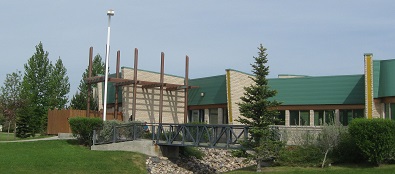All Nations Healing Hospital is one example of Indigenous-run health care cited by the FSIN. Photo courtesy Brownlee Beaton Kreke Consulting Engineers website.
The Federation of Sovereign Indigenous Nations has issued a cutting criticism of the province’s plan to consolidate all existing health regions.
Vice-Chief Bob Merasty said it seems that rather than improving Indigenous health care to match what the rest of Saskatchewan’s residents receive, the province is going to close the gap by “lowering the standard of care for everyone else.”
That comment by Merasty was contained in a news release issued on Thursday in response to the Wednesday announcement that the province’s 12 health regions will be replaced with a single provincial health authority.
Merasty says the provincial health system has “overwhelmingly failed our people” in closing the gaps in health for Indigenous peoples, even after the province signed a 2008 memorandum of understanding on health along with FSIN and the federal government.
Now, Merasty is calling on Indigenous people to “take the lead and develop a system for our people, by our people.”
Chief Bobby Cameron said there are decades of evidence that “Indigenous peoples in Saskatchewan have been taking a greater role in the design and delivery of health services in the province.”
This includes All Nations Healing Hospital in Fort Qu’Appelle, which has run for 12 years, and the Northern Inter-Tribal Health Authority, which has provided third-level services in the north for nearly 20 years. For years, Prince Albert Grand Council’s leadership has been promoting the idea of building a First Nations-operated hospital.
Cameron says, in light of the continual erosion of the treaty right to health, now is the time for Indigenous people to move forward with creating their own culturally relevant health system.
FSIN also says fiscal reasons are at the heart of the province’s plan, not the wellbeing of its people.
FSIN represents all of the province’s 74 First Nations.
